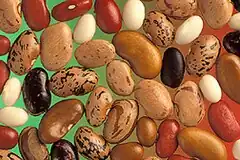Portal:Agriculture/Selected article/9
"Bean" is a common name for large plant seeds of several genera of the family "fabaceae" (alternately "leguminosae") used for human food or animal feed.

The whole young pods of bean plants, if picked before the pods ripen and dry, are very tender and may be eaten cooked or raw. Thus the term "green beans" means "green" in the sense of unripe (many are in fact not green in color). In some cases, the beans inside the pods of "green beans" are too small to comprise a significant part of the cooked fruit. Beans have significant amounts of fiber and soluble fiber, with one cup of cooked beans providing between nine and 13 grams of fiber. Soluble fiber can help lower blood cholesterol. Beans are also high in protein, complex carbohydrates, folate, and iron.
Beans are one of the longest-cultivated plants. Broad beans, with seeds the size of the small fingernail, were gathered in their wild state in Afghanistan and the Himalayan foothills. In a form improved from naturally occurring types, they were grown in Thailand already since the early seventh millennium (BC), predating ceramics. They were deposited with the dead in ancient Egypt. Not until the second millennium BC did cultivated, large-seeded broad beans appear in the Aegean, Iberia and transalpine Europe. In the "Iliad" (late-8th century) is a passing mention of beans and chickpeas cast on the threshing floor. The oldest-known domesticated beans in the Americas were found in Guitarrero Cave, an archaeological site in Peru, and dated to around the second millennium BCE. (Full article...)